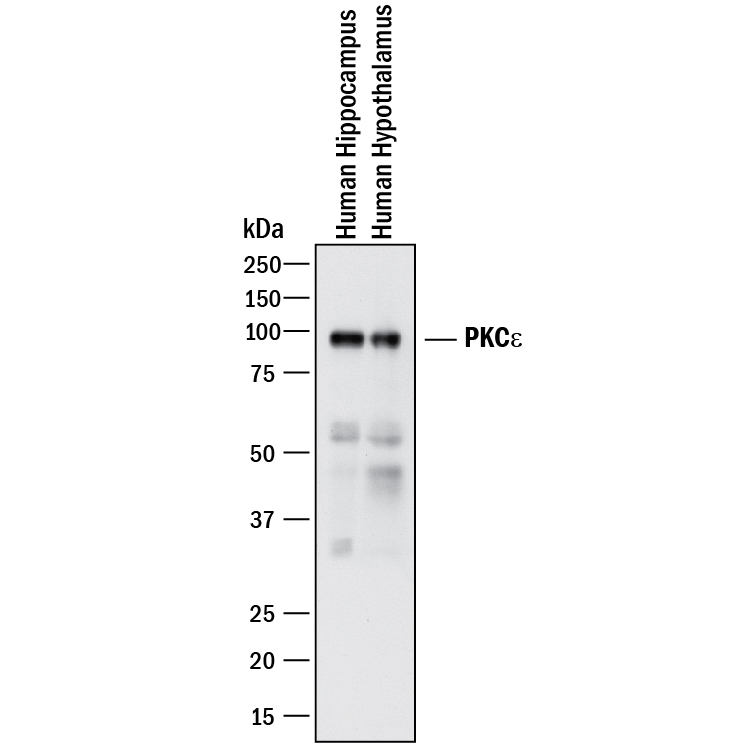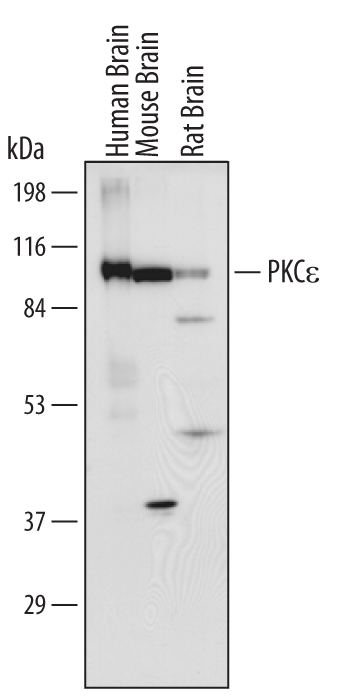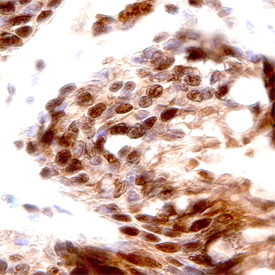Human/Mouse/Rat PKC epsilon Antibody Summary
Gln580-Pro737
Accession # Q02156
Applications
Please Note: Optimal dilutions should be determined by each laboratory for each application. General Protocols are available in the Technical Information section on our website.
Scientific Data
 View Larger
View Larger
Detection of Human PKC epsilon by Western Blot. Western blot shows lysates of human brain (hippocampus) tissue and human brain (hypothalamus) tissue. PVDF membrane was probed with 1 µg/mL of Sheep Anti-Human/Mouse/Rat PKCe Antigen Affinity-purified Polyclonal Antibody (Catalog # AF5134) followed by HRP-conjugated Anti-Sheep IgG Secondary Antibody (Catalog # HAF016). A specific band was detected for PKCe at approximately 90 kDa (as indicated). This experiment was conducted under reducing conditions and using Immunoblot Buffer Group 1.
 View Larger
View Larger
Detection of Human/Mouse/Rat PKC epsilon by Western Blot. Western blot shows lysates of human, mouse, and rat brain tissue. PVDF membrane was probed with 1 µg/mL of Human/Mouse/Rat PKCe Antigen Affinity-purified Polyclonal Antibody (Catalog # AF5134) followed by HRP-conjugated Anti-Sheep IgG Secondary Antibody (Catalog # HAF016). A specific band was detected for PKCe at approximately 90 kDa (as indicated). This experiment was conducted under reducing conditions and using Immunoblot Buffer Group 1.
 View Larger
View Larger
PKC epsilon in Human Lung Cancer Tissue. PKCe was detected in immersion fixed paraffin-embedded sections of human lung cancer tissue using Human/Mouse/Rat PKCe Antigen Affinity-purified Polyclonal Antibody (Catalog # AF5134) at 15 µg/mL overnight at 4 °C. Before incubation with the primary antibody, tissue was subjected to heat-induced epitope retrieval using Antigen Retrieval Reagent-Basic (Catalog # CTS013). Tissue was stained using the Anti-Sheep HRP-DAB Cell & Tissue Staining Kit (brown; Catalog # CTS019) and counterstained with hematoxylin (blue). Specific staining was localized to nuclei. View our protocol for Chromogenic IHC Staining of Paraffin-embedded Tissue Sections.
Reconstitution Calculator
Preparation and Storage
- 12 months from date of receipt, -20 to -70 °C as supplied.
- 1 month, 2 to 8 °C under sterile conditions after reconstitution.
- 6 months, -20 to -70 °C under sterile conditions after reconstitution.
Background: PKC epsilon
PKC epsilon (protein kinase C-epsilon) is an 87 kDa member of the novel PKC subfamily, AGC Ser/Thr protein kinase family of enzymes. It is a widely-expressed Ca++‑insensitive, phospholipid-dependent enzyme that catalyzes the phosphorylation of multiple proteins. Human PKC epsilon is 737 amino acids (aa) in length. It contains two general regions: a non-Ca++-binding plus lipid binding regulatory region (aa’s 1‑99 and 169‑292, respectively), and an ATP-binding catalytic domain (aa 408‑668). Phosphorylation of PKC epsilon on Thr566, Ser368 and Ser729 activates its enzymatic activity and increases its molecular weight to 92 kDa. One potential splice form shows a 114 aa substitution for aa 118‑737. Over aa 580‑737, human PKC epsilon is 98% and 99% aa identical to mouse and canine PKC epsilon, respectively.
Product Datasheets
Citations for Human/Mouse/Rat PKC epsilon Antibody
R&D Systems personnel manually curate a database that contains references using R&D Systems products. The data collected includes not only links to publications in PubMed, but also provides information about sample types, species, and experimental conditions.
2
Citations: Showing 1 - 2
Filter your results:
Filter by:
-
Rebound increases in chemokines by CXCR2 antagonist in breast cancer can be prevented by PKC&delta and PKC&epsilon activators
Authors: N Erin, E Tav?an, Ö Akdeniz, VMS Isca, P Rijo
Cytokine, 2021-03-24;0(0):155498.
Species: Mouse
Sample Types: Cell Lysates
Applications: Western Blot -
Quercetin ameliorates paclitaxel-induced neuropathic pain by stabilizing mast cells, and subsequently blocking PKC?-dependent activation of TRPV1
Acta Pharmacol. Sin., 2016-08-08;37(9):1166-77.
Species: Rat
Sample Types: Whole Tissue
Applications: IHC-Fr
FAQs
No product specific FAQs exist for this product, however you may
View all Antibody FAQsReviews for Human/Mouse/Rat PKC epsilon Antibody
There are currently no reviews for this product. Be the first to review Human/Mouse/Rat PKC epsilon Antibody and earn rewards!
Have you used Human/Mouse/Rat PKC epsilon Antibody?
Submit a review and receive an Amazon gift card.
$25/€18/£15/$25CAN/¥75 Yuan/¥2500 Yen for a review with an image
$10/€7/£6/$10 CAD/¥70 Yuan/¥1110 Yen for a review without an image







